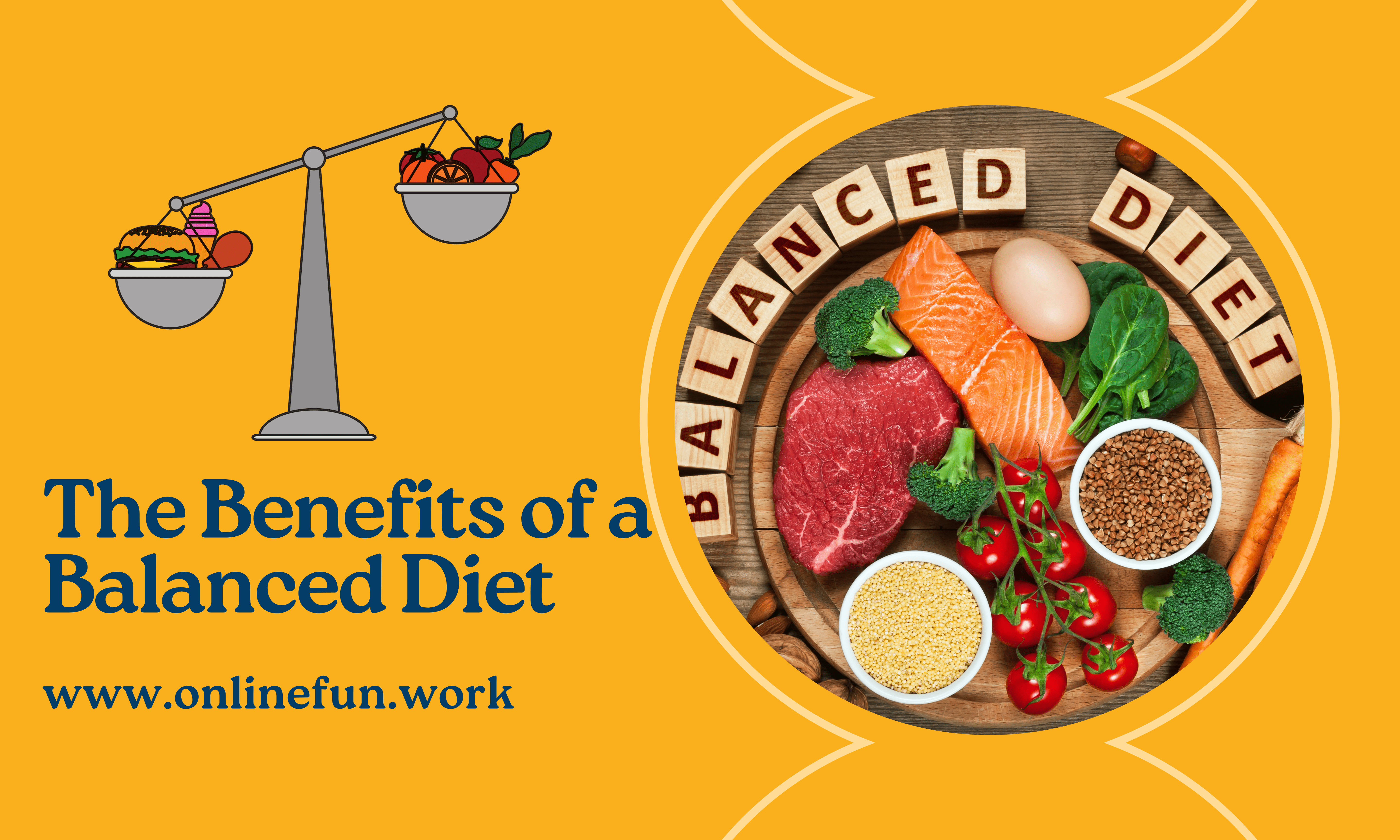The Benefits of a Balanced Diet
Introduction
In a world where fast food and convenience often take precedence, the importance of maintaining a balanced diet cannot be overstated. A balanced diet is a cornerstone of good health and overall well-being. This article delves into “The Benefits of a Balanced Diet”. The myriad benefits that come with adopting a diet that encompasses a wide variety of nutrients and food groups. From improved physical health to enhanced mental well-being, the advantages of a balanced diet are both numerous and profound.
What Constitutes a Balanced Diet?
Before we delve into the numerous benefits of a balanced diet, it’s essential to gain a comprehensive understanding of what exactly a balanced diet entails. A balanced diet is not a one-size-fits-all concept; rather, it’s a personalized approach to nutrition that focuses on including a diverse range of foods in the right proportions. This method guarantees that your body obtains the nutrition it requires to function properly. Here’s a full description of what a typical balanced diet consists of:
1. Fruits and Vegetables
Fruits and vegetables are rich in vitamins, minerals, and antioxidants that are essential for the body’s optimal functioning.
2. Protein Sources: The Building Blocks of Health
Proteins are the fundamental building blocks of the human body, playing an indispensable role in maintaining and enhancing health. They are composed of amino acids, which are essential for various bodily functions, making them a pivotal part of a balanced diet.
Proteins’ Role in Muscle Growth and Repair
One of the most well-known functions of proteins is their contribution to muscle growth and repair. When we engage in physical activities, whether it’s lifting weights, jogging, or simply carrying out our daily tasks, tiny muscle fibers undergo microscopic damage. Proteins, in the form of amino acids, step in to repair and strengthen these fibers. This process is what ultimately leads to muscle growth and improved muscle tone.
Proteins are especially valuable for individuals engaged in regular exercise or those who wish to build and maintain lean muscle mass. They help in the recovery of muscle tissue after workouts, reducing the risk of injury and enhancing physical performance.
Diverse Protein Sources for a Balanced Diet
To reap the benefits of proteins, a balanced diet should include a variety of protein sources to cater to different preferences and dietary restrictions. Here are some noteworthy options:
Lean Meats:
Poultry like chicken and turkey, as well as cuts of beef and pork with lower fat content, are excellent sources of high-quality protein. These meats are rich in essential amino acids, vitamins, and minerals. It’s advisable to opt for lean cuts and employ healthy cooking methods, such as grilling or roasting, to minimize added fats.
Fish:
Fish is another exceptional protein source that also provides heart-healthy omega-3 fatty acids. Salmon, tuna, mackerel, and trout are examples of fatty fish that are particularly rich in these beneficial fats. White fish like cod and haddock are also excellent choices for lean protein.
Eggs:
Eggs are a versatile and accessible source of protein. They are not only packed with protein but also offer a wide array of essential nutrients, including vitamin B12, vitamin D, and choline. Eggs can be prepared in numerous ways, making them a convenient addition to any diet.
Plant-Based Options:
For those who follow a vegetarian or vegan diet, plant-based protein sources like beans, lentils, tofu, and tempeh are excellent choices. These foods provide ample protein while also offering dietary fiber and various vitamins and minerals.They are also ecologically friendly and long-lasting.
By incorporating these diverse protein sources into your meals, you ensure that your body receives a broad spectrum of amino acids, each with its unique role in maintaining health. This comprehensive approach to protein not only supports muscle growth and repair but also contributes to overall well-being.
In essence, proteins are the architects of a healthy body. They are the cornerstone of muscle development, repair, and maintenance. By including a range of protein sources in your diet, you empower your body to thrive, whether you’re looking to build muscle, recover from workouts, or simply lead a healthier life.
3. Whole Grains
Whole grains like brown rice, quinoa, and whole wheat bread provide essential fiber and energy.
4. Dairy or Dairy Alternatives
Dairy products offer calcium, a vital nutrient for bone health, while alternatives like almond or soy milk cater to those with lactose intolerance.
The Benefits of a Balanced Diet
Now, let’s delve into the advantages of adopting a balanced diet:
1. Weight Management
Maintaining a balanced diet can help regulate body weight. The diverse nutrients help control cravings and provide a feeling of fullness, reducing the risk of overeating.
2. Improved Heart Health
Consuming a diet rich in fruits, vegetables, and whole grains has demonstrated its effectiveness in lowering the likelihood of heart disease while also contributing to the management of cholesterol levels and blood pressure.
3. Enhanced Digestive Health
Fiber from whole grains and fruits aids digestion, prevents constipation, and supports a healthy gut microbiome.
4. A stronger immune system
A balanced diet with ample vitamins and minerals bolsters the immune system, reducing the likelihood of illness.
5. Increased Energy
The combination of carbohydrates, proteins, and healthy fats in a balanced diet provides sustained energy throughout the day.
6. Mental Well-being
Nutrient-rich foods positively impact mental health. A balanced diet can reduce the risk of mood disorders and improve cognitive function.
7. Skin Health
The vitamins and antioxidants in fruits and vegetables contribute to a glowing complexion and healthy skin.
8. Better Bone Health
Calcium and vitamin D from dairy products and fortified foods are essential for strong bones.
9. Reduced Risk of Chronic Diseases
A balanced diet is associated with a lower risk of chronic diseases such as diabetes, cancer, and hypertension.
10. Longevity
Research indicates that individuals who adhere to a balanced diet tend to live longer and experience a higher quality of life.
Conclusion
In conclusion, a balanced diet is not just a choice; it’s a path to a healthier, happier life. By including a variety of nutrients and food groups, you can enjoy numerous benefits, from weight management and improved heart health to enhanced mental well-being and longevity. Making the switch to a balanced diet is an investment in your health and future.
ALSO READ: Physical Exercise
Frequently Asked Questions
1. How can I start transitioning to a balanced diet?
Transitioning to a balanced diet can be gradual. Begin by incorporating more fruits, vegetables, and whole grains into your meals and reducing processed foods and sugary drinks.
2. Are there specific foods that should be completely avoided in a balanced diet?
While moderation is key, it’s advisable to limit the intake of highly processed foods, sugary snacks, and excessive red meat, as these can have adverse health effects when consumed in excess.
3. Can a balanced diet help with weight loss?
Yes, a balanced diet can support weight loss by promoting healthier eating habits and reducing the consumption of calorie-dense, low-nutrient foods.
4. What are some simple meal ideas for a balanced diet?
Simple meal ideas include a colorful salad with mixed vegetables and lean protein, oatmeal with fruits and nuts for breakfast, and grilled fish with quinoa and steamed vegetables for dinner.
5. How long does it take to see the benefits of a balanced diet?
The timeframe varies from person to person, but some benefits, like increased energy and improved digestion, can be noticeable in just a few weeks, while long-term health benefits may take several months to become evident.




